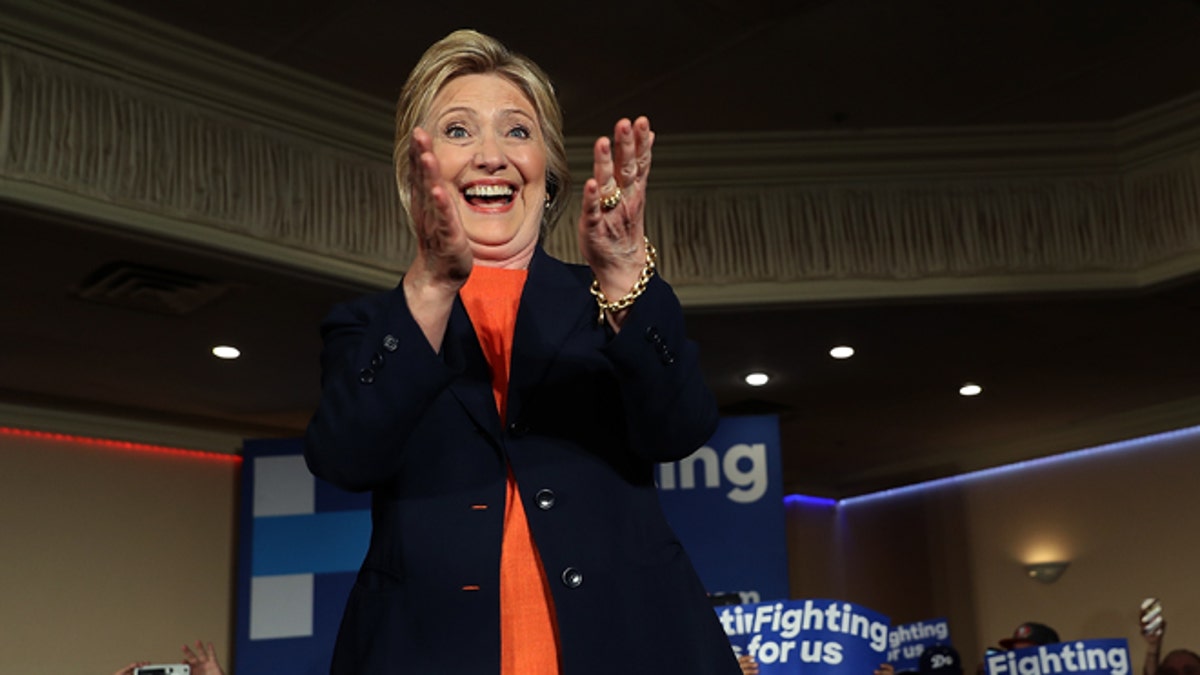
EL CENTRO, CA - JUNE 02: Democratic presidential candidate, former Secretary of State Hillary Clinton greets supporters during a campaign rally at the Barcelona Event Center on June 2, 2016 in El Centro, California. With less than a week to go before the California presidential primary, Clinton is campaigning in southern California. (Photo by Justin Sullivan/Getty Images) (2016 Getty Images)
In early August, a group of pollsters announced enough data had been collected in two traditionally Republican states, Georgia and Arizona, to move them to the “battleground” column.
And the Latino factor may have played a role.
Extraordinarily high unfavorable views of GOP presidential nominee Donald Trump by the Latino community are resulting in recent polls showing a remarkably tight race between the mogul and former Secretary of State Hillary Clinton.
A RealClearPolitics average of the most recent polls showed Trump with just 1.5 percent ahead of Clinton in Arizona, while trailing her in Georgia by the minuscule amount of 0.3 percent.
In the polls this translates into a few thousand ballots, many of which Democrats hope will be Latinos showing up to vote for the first time –– or for the first time in a very long time.
The Trump campaign is keenly mindful of the up-for-grabs status of both states – Trump will make his fifth visit to Arizona on Wednesday. He was to make a key immigration speech in Phoenix, but that is being postponed for the second time in as many weeks, and the visit will be a GOP "unity rally" instead, according to campaign officials. On Thursday, civil rights leader Dolores Huerta visited Arizona, where she appeared with several Latino elected officials to launch an anti-Trump campaign.
“Donald Trump being at the top of the ticket has really mobilized the Latino community, and other communities as well,” said Michael Smith, the communications director for the Democratic Party of Georgia.
“Not only his rhetoric, but, God forbid, the possibility of having Donald Trump sitting behind the desk at the White House,” Smith said, “is giving many people who didn’t vote before to feel an urgency to do so in November.”
While Trump began his campaign with a harsh tone on immigration, he has softened his rhetoric and is now promising Hispanics "a much better life." Trump's appeal to Hispanics largely echoed his recent outreach to African-Americans. He rarely tried to explicitly lure minority voters during his unlikely rise to the GOP nomination earlier this year.
Now facing a bigger electorate, Trump suggested Hispanics have been taken for granted by Democrats.
"Hispanics are tired of being used by these phony politicians," Trump said during a recent speech in Florida. "I say, what do you have to lose? I will fix it."
Democratic leaders in Georgia – where Latinos total about 1 million – are planning a major press conference in a few weeks where they expect more than 200 Latinos to attend to show their support for Clinton.
“They will be Latino leaders from all walks of life,” said Antonio Molina, the chairman of the Latino Caucus for the Democratic Party of Georgia, in an interview with Fox News Latino. “They will be publicly endorsing Hillary Clinton. And among those leaders will be conservatives, also.”
The New Georgia Project, a non-profit effort, says it has registered about 70,000 minority voters this year. That’s on top of the 30 percent increase in Latino voter registration the Georgia Democratic Party reports from last November to April.
Smith, the Democrat communications director, said this surge is probably related to the hardline moves regarding immigration made by Republican legislators several years ago, drafting measures aimed at cracking down on undocumented people.
“They scared a lot of people away, many Latinos just left Georgia,” Smith said. “We lost workers, people in the community who were working, paying their taxes, and who went to other states. They went to Alabama, North Carolina, other states that at the time were not hostile.”
In Arizona, Democrats are hoping that Donald Trump, along with controversial state Republicans such as Sheriff Joe Arpaio and former Gov. Jan Brewer, will help them make their case that Republicans back or actively push policies that work against the interests of Latinos.
About 2.1 million Latinos live in Arizona, and 992,000 of them are eligible to vote. Recent polls show that among Arizona Latino voters, Clinton leads as the favorite over Trump, 61-to-36 percent.
Carmen Maldonado, a Mexican-American resident of Chandler, Arizona has proudly voted for the Republican candidate for president since George W. Bush. She is Catholic, anti-abortion and a pro-military grandmother, who decorates her home with American flags and has goats and chickens on her ranch in the Arizona desert.
This year, for the first time in decades she is leaning toward voting for the Democrat in the race, even though she is not eager to do so.
U.S. Sen. John McCain, who is seeking his sixth term in the Senate, representing Arizona, told Fox News Latino some months ago that he was concerned that hardline rhetoric during the GOP presidential primaries about immigration and other issues that concern many Latinos would alienate the electorate and hurt even his campaign.
“The increasing demographic makes the Hispanic voter much more important than maybe [ever] in the past,” McCain said. “I don’t believe any Republican can be elected in the United States without a certain proportion of the Hispanic vote.”
McCain took particular exception to Donald Trump’s harsh words about Mexico and immigrants from there.
“I’m very concerned about that kind of rhetoric about our Hispanic citizens,” said McCain, who was the GOP presidential nominee in the 2008 race against Barack Obama. “It’s alienating a very significant majority of Hispanic voters.”












































